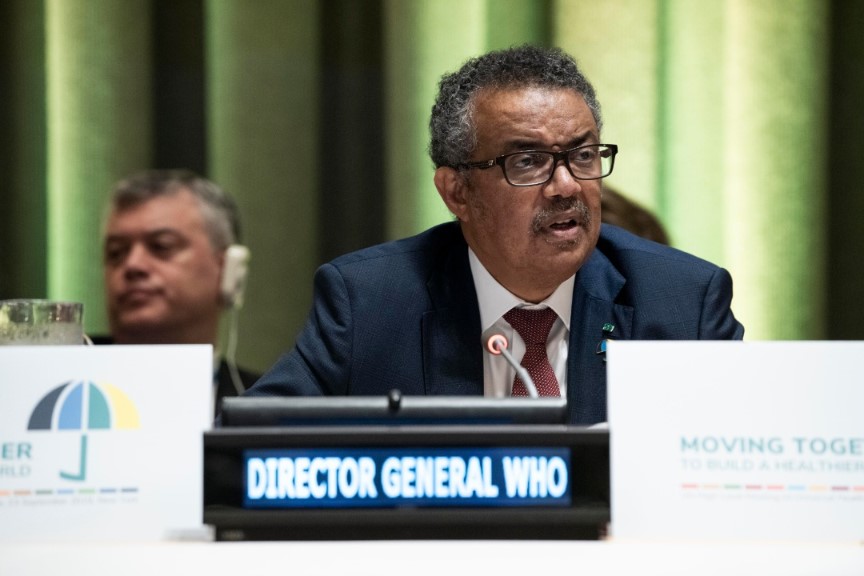KUALA LUMPUR, Jan 31 — The World Health Organization (WHO) declared the Wuhan coronavirus outbreak an emergency yesterday, as the mysterious illness killed over 200 and infected almost 10,000 globally.
An emergency committee meeting agreed that the outbreak now meets the criteria for a public health emergency of international concern, which is generally reserved for unusual and serious public health events that have the potential to spread disease globally.
The announcement legally requires states to ramp up their response to the crisis, though the WHO does not recommend any travel or trade restrictions for now, WHO director-general Tedros Adhanom Ghebreyesus said in a statement.
“In line with the need for global solidarity, the committee felt that a global coordinated effort is needed to enhance preparedness in other regions of the world that may need additional support for that,” he said.
He added that the declaration should be seen as one of “support and appreciation” for China, where the outbreak started, and the actions Beijing has taken on the frontlines of this outbreak, “and it is to be hoped, with success”.
AFP reported today that the global death toll from the new strain of coronavirus has risen to 213, all of which were recorded in China, while nearly 2,000 new cases have been confirmed, bringing the total figure to 8,931. No deaths were recorded outside of China.
Quoting China’s National Health Commission, AFP said that 43 new deaths had occurred as a result of the virus, all but one of them in hardest-hit Hubei province where the virus first emerged. Central Chinese city Wuhan is its capital.
A total of 9,821 cases have been reported worldwide, meanwhile, as of 9.39am, with the most number of cases outside of China in Hong Kong (15), Japan, Thailand, Singapore, Australia, Taiwan, and Malaysia (eight). Countries as far as Germany and the United States (US) have also reported confirmed cases. By contrast, SARS had infected over 8,000 people globally and killed nearly 800 during the 2002-03 epidemic.
The latest US case marked the first time the virus has spread from person to person in the country. Confirmations of human-to-human transmissions in Germany, Vietnam, Taiwan and Japan — as opposed to a traveller with a history of travelling to China — were also reported this week.
On January 23, Tedros said it was too early to classify the novel coronavirus known as 2019-nCoV as a global emergency, as it was only an emergency in China at the time. Only 17 deaths were recorded by the SARS-linked virus then.
In his latest statement, Tedros said the emergency committee acknowledged that there are still many unknowns, cases have now been reported in five WHO regions in one month, and human-to-human transmission has occurred outside Wuhan and outside China.
“The committee believes that it is still possible to interrupt virus spread, provided that countries put in place strong measures to detect disease early, isolate and treat cases, trace contacts, and promote social distancing measures commensurate with the risk,” he said.
Tedros said a WHO multidisciplinary technical mission will be going to China, comprising national and local experts, to review and support efforts to investigate the animal source of the outbreak, and the clinical spectrum of the disease and its severity.
The mission will also investigate the extent of human-to-human transmission in the community and in health care facilities, look at efforts to control the outbreak, and provide information to the international community to enable sharing of experiences and successful measures.
The WHO recommended that China enhance public health measures, surveillance and active case finding across the country, and continue to identify the zoonotic source of the outbreak, as well as conduct exit screening at international airports and ports.
For the rest of the world, the WHO said all countries should be prepared for containment, including active surveillance, early detection, isolation and case management, contact tracing and prevention of onward spread of the coronavirus.
Countries must also inform the WHO about any travel measures taken, as required by the International Health Regulations (IHR) (2005), and cautioned against actions that promote stigma or discrimination, in line with the principles of Article 3 of the IHR.
Malaysia has suspended entry to Chinese nationals from Hubei province, while Sabah has temporarily suspended all scheduled and chartered flights from China. Territories bordering China, meanwhile, have also banned entry of Hubei residents.








